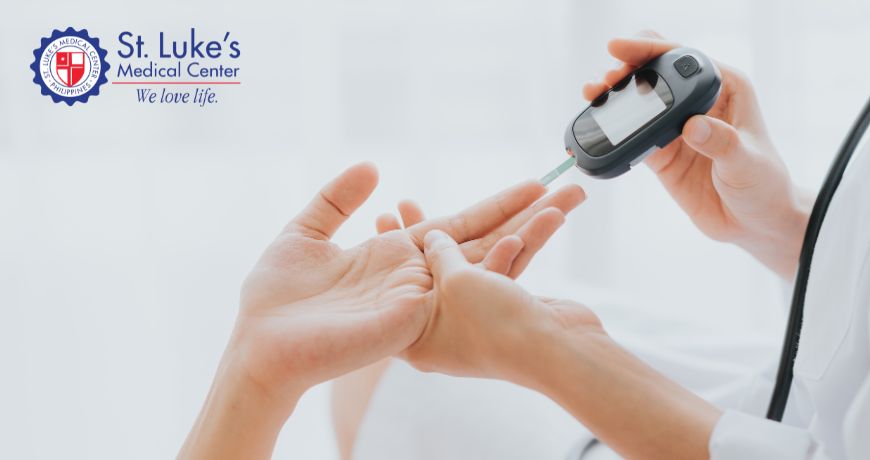Prevent, Detect, and Manage Diabetes with St. Luke’s Medical Center
Diabetes continues to be one of the leading causes of health complications in the Philippines, affecting millions of Filipinos and contributing to serious problems such as cardiovascular diseases, diabetic neuropathy, kidney failure, and vision loss. With the number of cases rising each year, understanding diabetes, its types, risk factors, and early signs is crucial for prevention and effective management.
What Is Diabetes?
Diabetes is a chronic disease that affects how your body turns food into energy. When you eat, your body breaks down carbohydrates into glucose (sugar), which enters your bloodstream. Your pancreas then produces insulin to help glucose enter your cells. In people with diabetes, this process doesn’t work properly, resulting in excess glucose in the blood, which can lead to long-term health complications.
Types of Diabetes
There are several types of diabetes, each with different causes and treatment approaches:
Type 1 Diabetes: An autoimmune disorder where the immune system attacks insulin-producing cells in the pancreas. It typically develops in childhood or adolescence but even adults can be affected and requires lifelong insulin therapy.
Type 2 Diabetes: A metabolic disorder where the body either doesn’t produce enough insulin or becomes resistant. It’s the most common form of diabetes and is often managed through lifestyle changes, oral medication, and sometimes insulin.
Gestational Diabetes: Occurs during pregnancy and may go away after delivery, but it increases the risk of developing Type 2 diabetes later in life.
Common Symptoms of Diabetes
Recognizing early symptoms can make a huge difference in timely diagnosis and treatment. However, it’s important to note that early diabetes is often asymptomatic, especially in Type 2 diabetes. This means many people may not realize they have it until complications arise.
When symptoms do appear, they may include:
- Increased thirst and frequent urination
- Increased hunger
- Unexplained weight loss
- Fatigue and weakness
- Blurred vision
- Slow-healing wounds
- Frequent infections (gum, skin, vaginal)
What Causes Diabetes?
The causes of diabetes vary by type. For instance:
- Type 1 diabetes is believed to be triggered by genetic and environmental factors, including certain viruses.
- Type 2 diabetes is strongly linked to lifestyle, diet, and genetics.
In all cases, family history is a major risk factor.
Who Is at Risk?
While anyone can develop diabetes, certain individuals are more at risk. You may need a diabetes screening if you have:
- A family history of diabetes (parents or siblings)
- A history of gestational diabetes
- Polycystic ovary syndrome (PCOS)
- Fatty liver disease
- Unexplained weight loss
- High blood sugar during routine checkups
Early Detection and Management at St. Luke’s Medical Center
St. Luke’s Medical Center offers comprehensive care and diagnostic services for individuals at risk of or living with diabetes. Our specialized Diabetes Screening Package executive checkup at the Wellness Center is ideal for those with a family history or other risk factors.
We also provide OGTT (Oral Glucose Tolerance Test) Panel which measures the body’s response to glucose and helps diagnose diabetes, prediabetes, and gestational diabetes.
Our Center for Diabetes, Thyroid, and Endocrine Disorders supports patients through:
- Diabetes education consultations
- Diabetes screening tests
- Self-monitoring blood glucose training
- Personalized care plans for diabetes management
Take Control of Your Health
If you want to be screened for diabetes or suspect that you or a loved one might have
diabetes, don’t wait. Early detection and proper treatment can prevent serious
complications. Visit St. Luke’s Medical Center and consult with our experts to get
screened and start managing your health today.
Your health matters. Start your journey to better wellness with St. Luke’s.





